|
|
|
Sort Order |
|
|
|
Items / Page
|
|
|
|
|
|
|
| Srl | Item |
| 1 |
ID:
021029
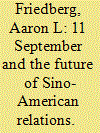

|
|
|
|
|
| Publication |
2002.
|
| Description |
33-50
|
|
|
|
|
|
|
|
|
|
|
|
|
|
|
|
| 2 |
ID:
131309


|
|
|
|
|
| Publication |
Oxon, Routledge (IISS), 2014.
|
| Description |
155p.Pbk
|
| Series |
Adelphi Series (No.444)
|
| Standard Number |
9781138808324
|
|
|
|
|
|
|
|
|
|
|
|
Copies: C:1/I:0,R:0,Q:0
Circulation
| Accession# | Call# | Current Location | Status | Policy | Location |
| 057769 | 355.0310973095/FRI 057769 | Main | On Shelf | General | |
|
|
|
|
| 3 |
ID:
114119


|
|
|
|
|
| Publication |
2012.
|
| Summary/Abstract |
For decades, U.S. China policy has been driven by a combination of engagement and balancing. The Obama administration has put too much weight on the first, and diplomatic happy talk has done nothing to halt Beijing's military buildup. The next administration should get real about China and bolster the balancing half of Washington's strategic equation.
|
|
|
|
|
|
|
|
|
|
|
|
|
|
|
|
| 4 |
ID:
160138
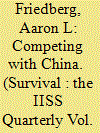

|
|
|
|
|
| Summary/Abstract |
There appears to be a growing consensus in Washington, and in the capitals of many other advanced industrial democracies, that prevailing policies towards China have failed and that an alternative approach is now urgently required. In a recent, widely read article in Foreign Affairs, two former Obama-administration officials conclude that, after years of ‘hopeful thinking’ about China's future, the United States finds itself confronting ‘its most dynamic and formidable competitor in modern history’.1
1 Kurt M. Campbell and Ely Ratner, ‘The China Reckoning: How Beijing Defied American Expectations’, Foreign Affairs, March/April 2018, p. 70.
View all notes
Republican Senator Marco Rubio describes the challenge in similar terms, noting that in the 240 years since its founding, the United States has never before ‘faced an adversary of this scale, scope, and capacity’.2
2 ‘Worldwide Threats Briefing: 5 Takeaways, From Russia to China’, Wired, 13 February 2018, https://www.wired.com/story/worldwide-threats-briefing-russia-election-china/.
View all notes
‘Decades of optimism about China's rise have been discarded’, declares The Economist.3
3 ‘How the West Got China Wrong: Decades of Optimism About China's Rise Have Been Discarded’, The Economist, 1 March 2018.
View all notes
‘We got China wrong’, writes an editorialist for the Washington Post. ‘Now what?’4
|
|
|
|
|
|
|
|
|
|
|
|
|
|
|
|
| 5 |
ID:
116641
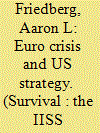

|
|
|
|
|
| Publication |
2012.
|
| Summary/Abstract |
For 45 years after the end of the Second World War, American strategists worried far more about Europe's perceived political, economic and military weakness than they did about its potential strength. Following the fall of the Berlin Wall and the end of the Cold War this pattern was briefly reversed. With the signing of the Treaty of Maastricht in 1992 the birth of a 'United States of Europe' seemed finally to be at hand. Possessed of a vast market and nascent institutions of central governance, this new entity was widely seen as having the potential to become a major player on the world stage.
|
|
|
|
|
|
|
|
|
|
|
|
|
|
|
|
| 6 |
ID:
157201
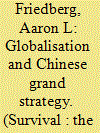

|
|
|
|
|
| Summary/Abstract |
Deng Xiaoping’s initiation of the ‘reform and opening up’ programme at the end of 1978 appears in retrospect to be the decisive turning point in the history of modern China. Increasing reliance on market forces, as opposed to state planning, and deeper integration into the global economy, in place of the old policy of self-imposed isolation and virtual autarky, launched China onto a steep growth trajectory. By any measure, economic or strategic, China’s decision to join the world has been an enormous success, raising the standard of living of hundreds of millions of people, enhancing the nation’s influence and prestige, and paving the way for its eventual re-emergence as a regional and global power on a par with the United States.
|
|
|
|
|
|
|
|
|
|
|
|
|
|
|
|
| 7 |
ID:
105031
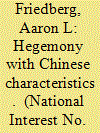

|
|
|
| 8 |
ID:
090185
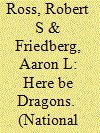

|
|
|
|
|
| Publication |
2009.
|
| Summary/Abstract |
It is past time for Americans to take seriously the challenge posed by the contining growth of China's military power. Triggered by the geopolitical shifts that accompanied the end of the cold war, fueled by the nation's repid economic growth, and driven by a mix of insecurity and ambition, today's buildup has been under way for the better part of two decades. Even before the collapse of the Soviet Union, Chinese strategists began to shift their attention from preparing for a massive, all-out "People's War against a nuclear-armed northern invader toward what they labeled" local war under high-tech conditions.
|
|
|
|
|
|
|
|
|
|
|
|
|
|
|
|
| 9 |
ID:
157280
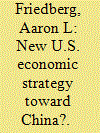

|
|
|
|
|
| Summary/Abstract |
U.S. policy toward China since the end of the Cold War has been premised on the assumption that expanding trade and investment would have beneficial effects beyond promoting economic growth, both on that country's external behavior and on the evolution of its domestic economic and political institutions. China's deepening relationship with the United States and its broader integration into the global economy would, it was hoped, give Beijing a strong interest in stability and encourage it to see itself as a “responsible stakeholder” in the existing international system. In this view, as China developed, it would move away from state-directed economic planning and place greater reliance on market mechanisms. In the long run, growth would create a new middle class and with it would come irresistible pressures for political liberalization.
|
|
|
|
|
|
|
|
|
|
|
|
|
|
|
|
| 10 |
ID:
172084
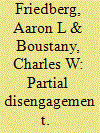

|
|
|
| 11 |
ID:
136635
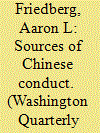

|
|
|
|
|
| Summary/Abstract |
Starting in 2009, an increasing number of foreign observers (and many Chinese as well) began to note a shift towards more forceful or “assertive” behavior on the part of Beijing.1 Among the most frequently cited indications of this trend were:
An internal debate among Chinese elites in which some participants advocated edging away from Deng Xiaoping's “hiding and biding” strategy and replacing it with something bolder and more self-confident;2
A “newly forceful, ‘triumphalist,’ or brash tone in foreign policy pronouncements,”3 including the more open acknowledgement—and even celebration—of China's increasing power and influence;
Stronger reactions, including the threatened use of sanctions and FINANCIAL leverage, to recurrent irritations in U.S.–China relations such as arms sales to Taiwan and presidential visits with the Dalai Lama;
More open and frequent displays of China's growing military capabilities including larger, long-range air and naval exercises, and demonstrating or deploying new weapons systems;
A markedly increased willingness to use threats and displays of force on issues relating to the control of the waters, air space, surface features, and resources off China's coasts. These include ongoing disputes with the Philippines and Vietnam (among others) in the South China Sea, with Japan in the East China Sea, and with the United States regarding its conduct of surveillance and military exercises in areas from the Yellow Sea to the vicinity of Hainan Island.
|
|
|
|
|
|
|
|
|
|
|
|
|
|
|
|
| 12 |
ID:
083393
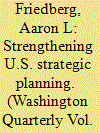

|
|
|
| 13 |
ID:
027404
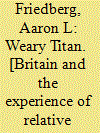

|
|
|
|
|
| Publication |
Princeton, Princeton University Press, 1988.
|
| Description |
xvii, 329p.Hbk
|
| Standard Number |
0691055327
|
|
|
|
|
|
|
|
|
|
|
|
Copies: C:1/I:0,R:0,Q:0
Circulation
| Accession# | Call# | Current Location | Status | Policy | Location |
| 030877 | 941.081/FRI 030877 | Main | On Shelf | General | |
|
|
|
|
| 14 |
ID:
017641
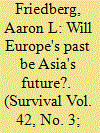

|
|
|
|
|
| Publication |
Autumn 2000.
|
| Description |
p147-160
|
|
|
|
|
|
|
|
|
|
|
|
|
|
|
|
|
|
|
|
|